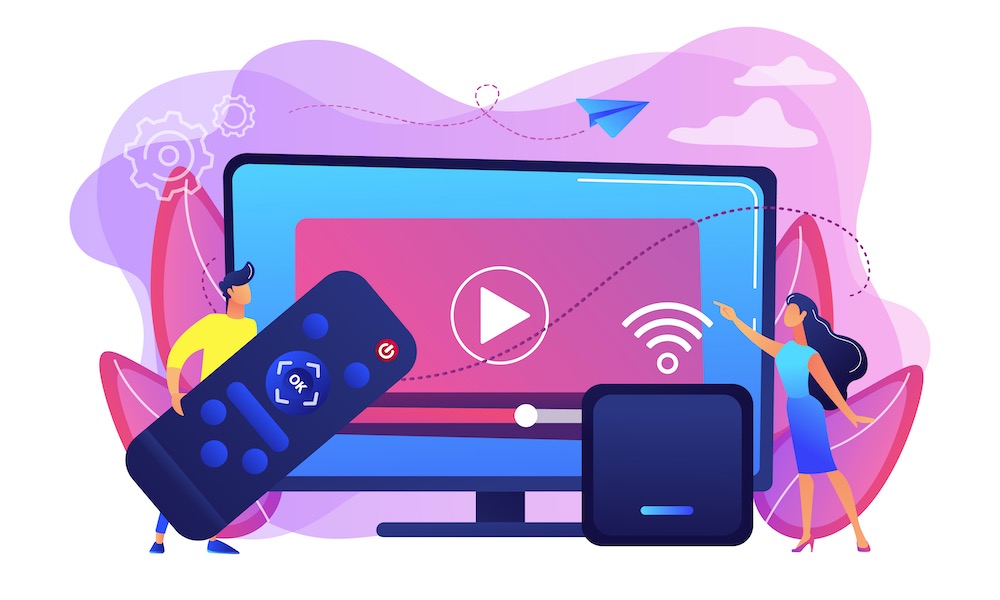Do You Really Need a Smart TV? What’s the Point? Here’s What You Should Know
 Credit: Visual Generation
Credit: Visual Generation
Toggle Dark Mode
If you’re looking for a new or discounted TV these days, you’ll see a lot of talk about “smart” TVs. That sounds good, right? After all, smart devices are very popular and a smart home offers many practical advantages.
But what does a smart TV actually do – and is it worth it?
It turns out, the features that make a tv “smart” may not matter at all for the modern entertainment system, and we’re going to talk about why along with situations where a smart TV can be worth it.
What Do Smart TVs Do, Anyway?
Smart TVs are incredibly common on the market, but besides a label on the box, what does that mean for TV features?
Smart TVs use advanced menus and a connection to your Wi-Fi network to offer additional features and capabilities. They’re a little more like a computer than a traditional TV, and offer access to services that you can also find on any computer or mobile device.
In practice, that means apps – especially streaming apps that give access to video content. This includes access to Netflix, YouTube, Amazon Prime Video, and similar services you may have an account with.
Some smart TVs also allow you to connect to social media apps, or even browse the web right from the TV. More rarely, smart TVs can be compatible with voice assistants like Alexa for voice control.
Smart TVs Struggle with Unique Features
As you were reading our previous description, you may have noticed that smart TVs don’t really have original features. Everything that smart TVs do is essentially borrowed from something else, typically set-top boxes, mobile devices, and smart displays.
Any of those devices can connect to Wi-Fi and let you download and use all your favorite streaming apps – and this is where we run into the big problem with smart TVs. It’s usually just a lot of overlap with what you already have.
For example, if you have an Apple TV box, you can already do everything that a smart TV can – plus you get access to additional extras and services that aren’t usually available directly from a TV.
Since you can just move your Apple TV to a new TV display when you buy, this means you can ignore the “smart” label altogether, and probably save a little money on a new television.
This doesn’t just work with Apple TV, it applies to every set-top box or related device. If you have a Roku or Chromecast, a smart TV won’t do anything new for you.
If you have an Xbox or PlayStation console, the same is true. Even smart speakers have voice assistant capabilities and other overlapping features.
Add all of these devices up, and you probably have at least one in your entertainment system already. That makes smart TVs mostly superfluous – but there’s also another issue at work.
Smart TV, Just Another Unwanted Platform?
Another problem with smart TVs is that they add an additional platform to your digital life. We’ve seen this issue a lot in recent years with smart homes, as every new smart device you get means learning how to use another app. That’s why recent trends have pushed for coordination and compatibility among smart devices so that they can all be controlled from the same app. That approach doesn’t really work with smart TVs.
That’s also compounded by how smart TV platforms have poor user interfaces compared to other options like the Apple TV. Navigating a smart TV menu is slow, annoying, and requires learning a new system you’ll never use for anything else. While some smart TVs have incorporated other more popular platforms like Fire TV or Chromecast, many just use their own native platforms, which tend to have poor performance. It’s just another layer of unnecessary things.
When Smart TVs Can Work
With our warning complete, we do want to mention a few situations where a smart TV can be a good pick. First, you may simply not have any other smart devices in your entertainment system. If nothing but speakers are hooked up to your TV, then a smart TV can be a great choice, as long as you’re willing to learn a new platform via remote. It may be the only way to access popular apps like Netflix and HBO on your big screen.
The second case is with TVs that support sharing content through services like AirPlay. The ability to start a show on a mobile device and flick it over to your TV when you’re ready to sit down can be very valuable, and it’s one feature that smart TVs usually handle well.






